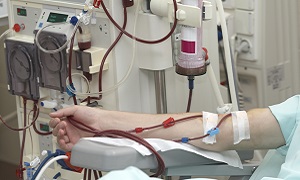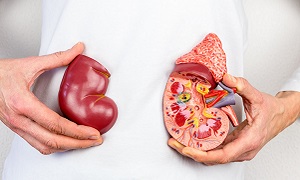Best Doctors in India for Glomerulonephritis Treatment
Best Hospitals in India for Glomerulonephritis Treatment
- City: Mumbai, India
Hospital Highlights:
- Fortis Hiranandani hospital was established in 2007.
- The hospital is an advanced tertiary care, multi-specialty hospital equipped with 149 beds.
- The hospital is equipped with a super ICU to provide emergency medical care to critically ill patients.
- The hospital is NABH accredited.
- The critical care facility in the hospital is augmented with the state-of-the-art facilities that facilitate speedier diagnosis and efficient monitoring.
- The hospital provides specialty medical services in cardiology, orthopedic science, pediatric science, neurology, diabetic care, urology, nephrology, ENT, obstetrics, gynecology, cosmetic surgery, bariatric surgery, neuro and spine care.
- City: Gurugram, India
Hospital Highlights:
- W Pratiksha Hospital, Gurugram, is one of the best hospitals in the NCR region. It is also a top hospital in India for IVF. Since its inception, the hospital has performed over 5500 successful IVFs. The hospital also specializes in gynecology.
- With over 20 years of experience in providing quality healthcare, the hospital is known as one of the most trusted and valued health providers in India.
- Equipped with world-class medical facilities and advanced technology, the hospital’s doctors and clinicians also have a track record of delivering excellent results. The hospital is also known for focusing on preventive well-being as much as on curative treatment.
- The hospital has earned the trust of its patients, by providing the best available treatments at affordable costs.
- City: Gurugram, India
Hospital Highlights:
- Paras hospital was established in 2006 and is the 250 bedded flagship hospital of Paras Healthcare.
- The is supported by a team of doctors of international and national repute.
- The hospital is NABH accredited and also the first hospital in the region to have a NABL accredited laboratory.
- The hospital provides specialty medical services in around 55 departments including Neurosciences, Joint Replacement, Mother & Child Care, Minimal Invasive Surgery, Gynecology and Obstetrics, Ophthalmology, Dermatology, Endocrinology, Rheumatology, Cosmetic and Plastic surgery.
- The hospital is equipped with state-of-the-art technologies.
- City: Kolkata, India
Hospital Highlights:
- Fortis Hospital, Anandapur, Kolkata is a world-class super-speciality equipped with the latest technologies in the medical world.
- The hospital is NABH accredited.
- This state-of-the-art facility specializes in cardiology and cardiac surgery, urology, nephrology, neurosciences, orthopaedics, digestive care, emergency care and critical care.
- The hospital, governed by integrated Building Management System (IBMS), has a pneumatic chute system, for quick vertical and horizontal transportation between floors, facilitating speedy transfer of patient specimens, documents, reports, and medicines to the concerned departments.
- The hospital also has a nephrology department with over 28 advanced dialysis units.
- City: Mumbai, India
Hospital Highlights:
- SL Raheja hospital is a 140-bed multi-specialty tertiary care hospital that is being managed by Fortis Healthcare Ltd.
- The hospital is a benchmark in healthcare and medical facilities in the neighborhood of Mahim & the western suburbs.
- L.Raheja Hospital, Mahim has one of the most effective ICU and Casualty care services.
- The hospital provides specialty medical services in Cardiology, Oncology, Neurology, Orthopedics, Mother & Child Care, and in Diabetes.
- City: Mumbai, India
Hospital Highlights:
- Wockhardt Hospitals were established in the year 1973, originally called First Hospitals and Heart Institute.
- Wockhardt Hospitals are super specialty health care networks in India, nurtured by Wockhardt Ltd, India’s 5th largest Pharmaceutical and Healthcare company.
- Wockhardt Hospitals is associated with Partners Harvard Medical International, an international arm of Harvard Medical School, USA.
- Wockhardt Heart Hospital performed India’s first endoscopic heart surgery.
- The hospital has a state-of-the-art infrastructure equipped with the latest technologies and modern equipment.
- It has special Centers of Excellence dedicated to the major specialties to provide hassle-free and high-quality clinical care.
- City: Gurugram, India
Hospital Highlights:
- The CK Birla Hospital in Gurugram is a NABH-accredited multi-specialty hospital.
- The hospital strives to increase the quality of healthcare by focusing on UK NHS nurse and midwife training requirements. Policies and practices derived from the National Institute for Health and Treatment Excellence (NICE) recommendations in the United Kingdom ensuring that a strong focus on safety, high-quality clinical care, and sanitation is maintained.
- The hospital’s cutting-edge technology and facilities allow for real-time communication and seamless collaboration among caregivers, ensuring accuracy and the best possible results. Those with foreign experience and accreditations make up part of the hospital’s team of clinicians.
- City: Ahmedabad
Hospital Highlights:
- As a member of the Apollo Hospitals Group, Apollo Hospitals International Limited, Ahmedabad is one of the most popular and sought-after medical facilities in Gujarat.
- Through its 6 Centres of Excellence and various affiliated branches, which cover all specialties and subspecialties, the hospital provides the most advanced clinical services.
- Since its inception in 2003, the hospital has been providing each patient with the most up-to-date medical equipment and state-of-the-art technology.
- With more than 150 successful organ transplants, including liver and renal transplants, the facility has been able to build a strong and extensive organ transplant program.
- In addition to performing 600 surgeries and caring for over 1800 patients on an IP basis, the hospital sees more than 18,000 patients on average in the outpatient department.
- With one of the biggest cardiology teams in the area, the hospital provides state-of-the-art regional care treatment in Cardiac Sciences.
- Additionally, the hospital offers a broad range of Neuro Interventional techniques to help stroke patients recover more quickly.
- City: Noida, India
Hospital Highlights:
- Jaypee Hospital is the flagship hospital of the Jaypee Group.
- This hospital has commissioned 525 beds in the first phase and has been planned and designed as a 1200 bedded multi-specialty facility.
- It holds the accreditation of the NABH and NABL.
- The hospital has state-of-the-art infrastructure equipped with the latest technologies and modern equipment like 64 Slice PET CT, Dual Head 6 Slice SPECT CT, Gamma Camera, and Da Vinci Robotic Surgery for comprehensive robotic surgical solutions.
- It has special Centers dedicated to the major specialties to provide hassle-free and high-quality clinical care.
- City: Mumbai, India
Hospital Highlights:
- Reliance Hospital is one of the best super-specialty care hospitals in Navi Mumbai.
- The main purpose of this hospital is to become a trustworthy place for the best health and hope for society. The hospital is well connected to the suburbs of Mumbai and Navi Mumbai.
- The hospital has various specialty departments, viz., Accident & Emergency, Anesthesiology, Dental Services, Dermatology, Diabetology, Dietetics Nutrition, Endocrinology, ENT, Gastroenterology, General Surgery, Gynaecology And Obstetrics, Hepato Pancreato Biliary Surgery, Infectious Disease, Internal Medicine, Interventional Radiology, Laboratory Medicine, Minimal Access Laparoscopic Surgery, Nephrology, Neurosciences, Opthalmology, Orthopaedics, Paediatrics, Pain Management Palliative Care, Physical Medicine Rehabilitation, Plastic And Reconstructive Surgery, Psychiatry, Pulmonary Medicine, Radiology, Rheumatology, Transplant, Urology Andrology, Vascular Surgery
Glomerulonephritis
Glomerulonephritis is a condition where the tiny filters in your kidneys, i.e. glomeruli, get inflamed. Glomeruli help you to remove excess fluid and waste from your bloodstream, which is then passed into your urine. This condition can come on suddenly or develop gradually. Both types may be fatal.
Glomerulonephritis can occur on its own or sometimes it may be a complication of another disease such as diabetes or lupus. Your kidneys can get damaged if there is severe or prolonged inflammation caused by glomerulonephritis. Therefore, early diagnosis and treatments are quite important.
Symptoms
Symptoms that you experience usually depend on what type of glomerulonephritis you are having and the severity of the condition.
Symptoms of acute glomerulonephritis include the following:
- Puffiness in your face
- Extra fluid in your lungs, which can lead to coughing
- Urinating less often
- Blood in your urine
- High Blood Pressure
The chronic form of glomerulonephritis can sometimes occur without any symptoms. There might be slow development of symptoms that are similar to the acute form. Some of the symptoms include the following:
- Blood or excess protein in your urine, which may be microscopic and show up in urine tests
- High blood pressure
- Pain in the abdomen
- Frequent nosebleeds
- Swelling in your ankles and face
- Frequent nighttime urination
- Bubbly or foamy urine, caused by excess protein
In some cases, your glomerulonephritis might get so advanced that it can lead you to develop kidney failure. Some of the symptoms of this can include the following:
- Fatigue
- Lack of appetite
- Nausea and vomiting
- Insomnia
- Muscle cramps at night
- Dry and itchy skin
Causes
Several conditions can lead to glomerulonephritis. The disease is also sometimes known to run in families. In other cases, the disease may be unknown.
The following causes can lead to inflammation of the glomeruli:
Post-streptococcal glomerulonephritis- Glomerulonephritis can develop some days after you recover from a strep throat infection or, in rare cases, a skin infection. To combat the infection, your body is going to produce extra antibodies that may eventually settle in the glomeruli, and lead to inflammation.
This type of glomerulonephritis is more common among children than adults. But they are also likely to recover more quickly.
Bacterial endocarditis- Bacteria can spread occasionally through the bloodstream and lodge in your heart, leading to an infection of one or more of your heart valves. If you have a heart defect, such as a damaged or artificial heart valve, then you are at a greater risk. Bacterial endocarditis is associated with glomerular disease, though the connection between the two is still unclear.
Viral infections- There are several viral infections, such as the human immunodeficiency virus (HIV), hepatitis B, and hepatitis C, which can also cause glomerulonephritis.
Goodpasture’s syndrome- This is a rare immunological lung disorder that is similar to pneumonia. Goodpasture’s syndrome leads to bleeding in your lungs as well as glomerulonephritis.
Lupus- This is a chronic inflammatory disease, which can affect many parts of your body, such as your joints, skin, blood cells, heart, kidneys, and lungs.
IgA nephropathy- This condition is characterized by recurrent episodes of blood in the urine. This primary glomerular disease is a result of deposits of immunoglobulin A (IgA) in the glomeruli. IgA nephropathy can progress for years without any noticeable symptoms.
Polyarteritis- This is a form of vasculitis which affects small and medium blood vessels in several parts of your body, like your heart, kidneys, and intestines.
Granulomatosis with polyangiitis- This form of vasculitis, which is formerly known as Wegener’s granulomatosis, can affect small and medium blood vessels in your lungs, upper airways, and kidneys.
High blood pressure- High blood pressure can damage your kidneys and impair their ability to function normally. Glomerulonephritis can also lead to high blood pressure since it reduces kidney function and can also influence how your kidneys handle sodium.
Diabetic kidney disease (diabetic nephropathy)- This can affect anyone having diabetes, generally taking years to develop. Good control of blood sugar levels and blood pressure can however prevent or slow kidney damage.
Focal segmental glomerulosclerosis- This condition is characterized by scattered scarring of some of the glomeruli, and it can result from another disease or sometimes occur for no known reason.
Infrequently, chronic glomerulonephritis also runs in families. One inherited form, Alport syndrome, may impair one’s vision or hearing.
Glomerulonephritis is associated with certain cancers as well, such as multiple myeloma, lung cancer as well as chronic lymphocytic leukemia.
Diagnosis
Glomerulonephritis is often detected during a routine urine analysis. Tests to assess your kidney function and for diagnosis of glomerulonephritis can include:
Blood tests
Urine test
Imaging tests
If your doctor detects evidence of damage, he/she can recommend a kidney X-ray, a CT scan, or an ultrasound exam.
Kidney biopsy
Treatment
Treatment is going to depend on several factors such as whether the condition is acute or chronic, the underlying cause, as well as the severity of the symptoms.
Medication
Glomerulonephritis after a strep infection should generally clear up without any treatment, though your doctor might prescribe antibiotics to kill the pathogens that are causing the infections. However, the patient will also likely need to reduce the intake of fluids as well as avoid food and drinks containing alcohol or high levels of protein, potassium, or salt.
Dialysis
Kidney transplant
A kidney transplant can be possible if the individual is healthy. However, for people who cannot undergo a transplant, dialysis is the only option.
Complications
Glomerulonephritis can cause severe damage to your kidneys, making them lose their filtering ability. Some of the possible complications of glomerulonephritis include:
High blood pressure- Damage to your kidneys and the resulting buildup of wastes in your bloodstream may eventually cause your blood pressure to rise.
Acute kidney failure– Loss of function in the filtering part of the nephron can lead to rapid accumulation of waste products. Due to this, you might require emergency dialysis, which is an artificial means of removing extra fluids and waste from your blood, using an artificial kidney machine.
Chronic kidney disease– In this condition, your kidneys lose their filtering ability. Kidney function that deteriorates to below ten percent of normal capacity results in end-stage kidney disease, which can require dialysis or a kidney transplant to help sustain life.
Nephrotic syndrome- With this syndrome, too much protein in your urine causes too little protein in your blood. Nephrotic syndrome may be associated with high blood cholesterol as well as swelling of your eyelids, feet as well as the abdomen.
Prevention
Although most forms of glomerulonephritis are not preventable, there are some ways to reduce the risk.
Some of the ways include the following:
- Seek medical attention if you have a strep infection causing a sore throat or impetigo
- Practice safe sex
- If you have blood pressure or diabetes, keep it in control
- Avoid the use of illegal intravenous drug as well as sharing needles
A healthy lifestyle with proper exercise, proper sleep, and a balanced diet can also help in reducing the risk of glomerulonephritis.

















